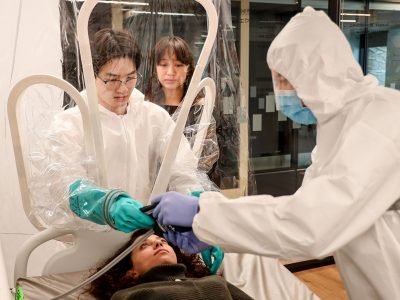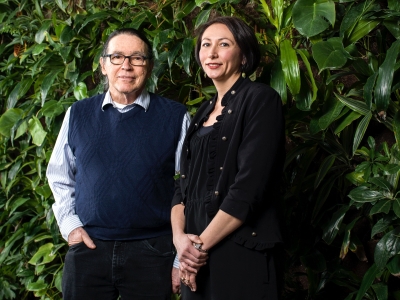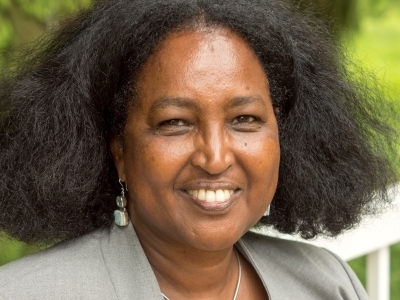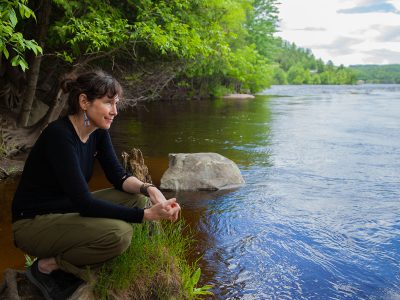By Joseph Mathieu
Photos by Chris Roussakis
Update: After her research presentation won first place and netted her a $1,000 award at the sixth annual Carleton 3MT competition on March 21, Daniella Briotto Faustino took second place at the provincial 3MT competition on April 19 at York University.
“Please raise your hand if you have never forgotten a password,” said Daniella Briotto Faustino as she began her Three Minute Thesis (3MT) presentation at Carleton University.
Embarrassed laughter rippled through the room, and no one raised a finger.
Everyone has trouble remembering every single password or PIN, said the second-year human-computer interaction student, but the challenge is even greater for the visually impaired.
“Imagine if while typing your password you couldn’t see the keys or the screen to make sure you are typing into the password field,” she said. “For more than 250 million people around the world who are blind or have low vision, that’s how passwords have to be dealt with.”

Founded by the University of Queensland in Australia, 3MT celebrates graduate student research and takes place at universities around the world. To boil down a year or more of research into no more than 180 seconds is quite a feat, but one that former participants have said builds confidence and enhances their presentation and communication skills.
In an online survey with more than 300 people from 14 countries, Briotto Faustino found that more than half of her respondents didn’t feel fully able to protect their digital information, and 30 per cent of those who own smartphones said they simply didn’t protect their devices with any unlocking method.
Participants in the 3MT can only use one slide in their presentation and Briotto Faustino’s showed a silicone device she built with flex sensors to capture and verify “bend passwords.’’ She began designing the device last September. It has a flexible middle and corners that users can bend or fold in a specific order to undo a digital lock.
Now in its 12th iteration, her device is based on research of two previous students of her supervisor Audrey Girouard: Sana Maqsood, who developed a flexible device and proved that bend passwords are more secure than PINs, and Matthew Ernst, who studied how a flexible device could help blind participants interact with their smartphones.
Briotto Faustino, a student in the School of Information Technology, aimed to have a functioning prototype by April to test visually impaired participants on how easy it is to memorize bend passwords.
“My research is the first to explore bend passwords for those with vision impairment,” she said, “and I hope it will encourage the creation of more accessible methods to unlock devices, so in the future everyone can feel fully able to protect their digital information.”

The judges scored the 10 final competitors on best communication style, comprehension, and engagement for a chance to win cash from a $2,000-purse donated by Carleton’s faculties of Arts and Social Sciences, Engineering and Design, Public Affairs, and Science. This year’s Carleton 3MT competition’s judges were Joy Mighty, Carleton’s associate vice-president (Teaching and Learning); Samah Sabra, a professional development officer in the Office of Quality Inititiaves; and Wayne Jones, university librarian.
“This is among my favourite events of the year,” said emcee Matthias Neufang, dean of the Faculty of Graduate and Postdoctoral Affairs. “I was at the semi-finals and I can say that the judges had a really, really tough job because all 19 competitors were just marvellous.”
Second place and its $500 prize was awarded to Architecture master’s student Victoria McCartney, who designed easily transportable kits of wildfire shelters for evacuees called Tinderboxes. After the most devastating wildfire in Canadian history destroyed Fort McMurray, Alta., in May 2016, evacuees had to spend 29 days living with hundreds of strangers in arenas, community centres and gyms.
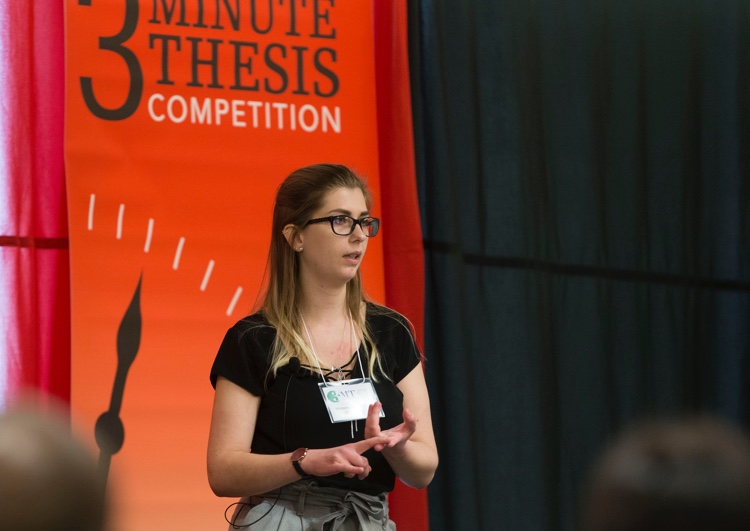
“All these spaces are big enough to hold hundreds of evacuees, but they are not designed to be used a home,” she said. “Tinderbox is a temporary and portable flat-packed shelter that provides evacuees with a healthy living environment, both during the evacuation and the community rebuild process.”
The interlocking panels and joints would allow two adults to assemble a shelter for a family of four in only two days, giving them a private sleeping area, electricity, bathroom and kitchenette.
Third place ($250) went to Mohamed Abdelazez in Systems and Computer Engineering, whose innovative research posited that a heart’s electric pulses could soon be used as a security password.
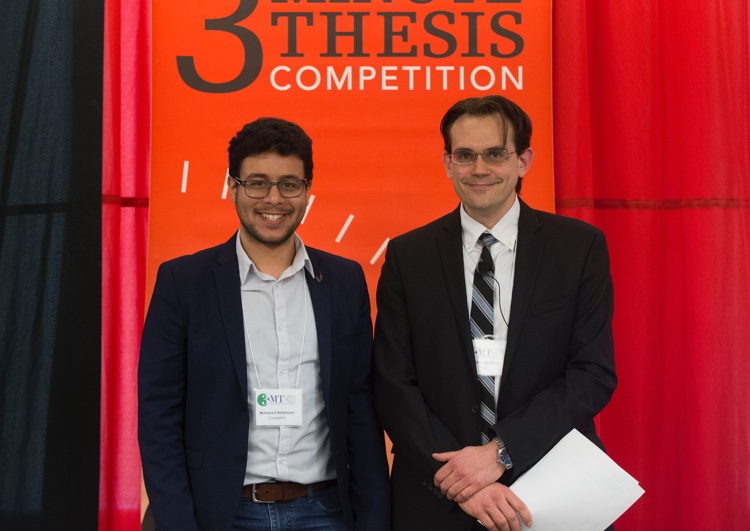
“In the future you’ll protect your privacy with your heart,” said Abdelazez. “The biometrics most commonly used are usually your fingerprints or your face,” he said, but high-resolution photography could easily allow anyone to capture your digits or create a mask with multiple angles of you face.
Password rules are becoming absurd, he said, and companies are shifting to biometrics to secure private information. His thesis describes how a person can be identified, whether they are running or sitting down, using a database of electrical heart pulses. The biometric is very accessible but hard to steal.
Applied Science master’s student Amin Ghaziaskar won the People’s Choice award ($250) for his project on sustainable biofuel.
“You’re able to use material that would other be decaying in landfills, contaminating drinking water or contributing to greenhouses gases,” he said.
His green biofuel from wood and agriculture waste – even animal manure – could be used for residential heating and power generation, even as a substitute for coal in steel making.
Friday, March 23, 2018 in Graduate Students, Research
Share: Twitter, Facebook
